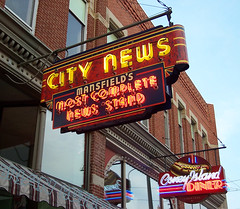 Warning: vaguely technical content. Feel free to skip.
Warning: vaguely technical content. Feel free to skip.
Background
For starters, there is a claim out there that "RSS is dead" or some such - it's fun to say "X is dead," apparently. Many people have no idea what RSS is, so maybe it was never alive anyway. But RSS is one of those technologies that sit underneath a lot of very useful services which certainly aren't dead. Anything that shares information across platforms on the web is using RSS (blogs, Twitter, Facebook, etc., etc.). People can also use RSS directly in RSS Readers or "news aggregators" which have seen a decline as RSS gets pushed into the social platforms where people reside. (The biggest RSS Reader is from Google: Google Reader - that doesn't necessarily make it the best.)
My friend Luis Suarez wrote The Death of the RSS Reader: Another Debate that Needs to End! yesterday, and then he also pointed me to a recent piece by Dave Winer on How to Reboot RSS, where he talks about the primary use of RSS as delivering news and that most of the RSS Readers fail in that job. (Winer is one of the originators of RSS.) Robin Good has an excellent discussion in Real-Time New Curation - The Complete Guide Part 2: Aggregation Is Not Curation. His discussion gets to the beauty of following people (newsmasters / curators), rather than following news alone.
What I want from RSS
My focus is on how I want to use RSS because there are several ways to use it - not just one. And I don't have the perfect answer yet, either. I have over 200 subscriptions in my Google Reader. Fortunately, many people (including me) don't publish nearly so much as in years past, so this number of subscriptions doesn't generate hundreds of items a day. But this is one of the issues with the current mode of RSS it seems to be all-or-nothing. A more realistic mechanism would represent what I really want to do.
People. I want to read everything written by my friends and colleagues. These people write on topics I care about, or they are people I care about, and I want to know what is happening with them. Caveat 1: I only want to see all the long-form things they write, not their social media updates - particularly not outside the context of the given social media platform (Twitter, Facebook, LinkedIn, etc.). I think this is one reason I don't particularly like seeing Delicious links in a feed from a weblog: it's not things that they have written. Caveat 2: There are some people for whom I do want to see ALL their updates - people like my wife or brother.
Topics. Along with items by my friends and colleagues, I would really like to get updates on topics in which I have an ongoing interest. I have tried a number of aggregating services, but none of them give me confidence that they are covering everything in those topic areas. This is an area where curation should be very helpful. So my fallback is to follow a wider range of people who write on those topics and quickly skim through their discussions to see if anything pops out at me. I tend to group these into folders by topic area.
Links. I like to know what my friends and colleagues find interesting, but I would like to get it in a way that makes it easy for me to browse. I particularly like the way Google Reader is doing this with "Shared" items. Google Reader shows me shared items from people I explicitly choose to follow, then I can skim through and read what I find interesting. The nice thing about the way this works is that it shows me the full article, rather than strictly the link - it would be nice it Google Reader could do this with other link-sharing services, like Delicious, but I think the plumbing would have to be different.
Interconnections. Of all the people and topics I follow, there are often interconnections between them. They may all reference a common article. Or they may bounce ideas back and forth between their discussions. I want to see this "threading" and interconnections between writings - they are often on separate websites and certainly in different RSS feeds. It is so much easier to read a given string of thoughts all in one place, rather than in a disjointed fashion. There were a couple RSS readers that attempted to do threading, but they never gained much traction: RSS Bandit (may be time to reinvestigate!) and SharpReader (no longer actively updated).
Discussions. Along with the interconnections among things that come through my reader, I'd also like to highlight specific conversations and have some mechanism to draw in comments and further discussion all grouped together as those discussions develop. For instance, in a "threaded" view, my article should appear alongside the article from Luis Suarez and Robin Good, since I follow both of their streams. If I decide to follow the discussion, I'd like to see the comments on all of the articles plus other references, such as to Dave Winer's piece.
I could probably write another bunch of things on the way I want to publish and use my own RSS feeds, but I'll leave that for another article.
[Photo: "Neon signs, Mansfield, Ohio - City News and Coney Island Diner" by Brian Butko]